Sleep Struggles with BDD: Supplements for Rest and Recovery
Introduction
Body Dysmorphic Disorder (BDD) is a condition that doesn’t clock out when the sun goes down. Even at night, the mind can remain trapped in overdrive—replaying intrusive thoughts, scanning perceived flaws, and worrying about how to face the next day. It’s no surprise that sleep disturbances are one of the most common and exhausting symptoms of BDD.
Poor sleep doesn’t just make mornings harder; it worsens emotional regulation, increases anxiety, and amplifies distorted self-perception. When you’re chronically tired, your ability to challenge negative thoughts or maintain perspective diminishes.
Fortunately, emerging research shows that restorative sleep can be supported through targeted nutritional and herbal supplements that help rebalance the nervous system and encourage deeper rest. This article explores why sleep problems are so common in BDD, how they affect brain chemistry, and which natural supplements can help promote calm, recovery, and resilience.
Looking for supplements for This? Click here.
Why Sleep Is So Difficult with Body Dysmorphic Disorder 💤⚡
People with BDD often describe their nights as “mentally loud.” The brain struggles to turn off, and moments meant for rest become filled with rumination and self-analysis.
This sleeplessness isn’t just psychological—it’s also physiological. BDD activates the sympathetic nervous system (fight-or-flight mode), increasing stress hormones like cortisol and adrenaline. These chemicals prepare the body for action, not rest, keeping the heart rate elevated and the mind alert long after bedtime.
Several key factors contribute to sleep struggles in BDD:
Anxiety and Rumination: Thoughts about appearance or social situations can trigger late-night overthinking, preventing relaxation.
Hypervigilance: The brain becomes conditioned to stay alert, scanning for potential threats—even in safe environments.
Serotonin Imbalance: Low serotonin affects both mood and the body’s ability to produce melatonin, the hormone that regulates sleep.
Cortisol Rhythm Disruption: Chronic stress can flatten or invert the natural cortisol curve, leading to high cortisol at night—when it should be lowest.
Screen Exposure and Comparison: Social media scrolling or mirror-checking before bed overstimulates the visual and emotional centers of the brain.
Together, these factors create the perfect storm for insomnia, restless sleep, and morning fatigue—all of which reinforce the emotional distress that fuels BDD symptoms.
The Emotional Consequences of Sleep Deprivation 😔
Sleep is not just physical rest—it’s mental recalibration. During deep sleep and REM cycles, the brain processes emotions, consolidates memory, and releases growth hormones that repair cells.
When sleep is disrupted:
The amygdala, the brain’s fear center, becomes hyperactive.
The prefrontal cortex, responsible for logic and reasoning, loses efficiency.
The body produces more cortisol and less serotonin.
Negative self-perceptions feel stronger and more believable.
This means that a poor night’s sleep can make body image distortions feel more real and more painful, even if nothing about your appearance has changed. Sleep, in this context, becomes not a luxury but an essential part of emotional stability and healing.
How Supplements Support Rest and Recovery 🌿

Supplements can’t replace therapy or good sleep hygiene, but they can support the body’s natural pathways for calmness, hormonal balance, and deep sleep.
The most effective sleep-supporting supplements for people with BDD target three key areas:
Reducing anxiety and hyperarousal
Balancing neurotransmitters like serotonin, GABA, and melatonin
Supporting stress hormone regulation (especially cortisol)
When used consistently, these nutrients can help re-establish a healthy circadian rhythm and improve the quality—not just the quantity—of sleep.
Let’s explore the most promising options.
Magnesium Glycinate: Calming the Nervous System 🌙
Magnesium is one of the most critical minerals for sleep and emotional regulation. It supports over 300 enzymatic reactions in the body, including those responsible for nerve signaling and muscle relaxation.
For people with BDD, magnesium glycinate is especially helpful because it calms both mind and body without sedation. It enhances GABA (the brain’s main inhibitory neurotransmitter), which helps turn off racing thoughts and physical tension.
Low magnesium levels are linked to increased cortisol, anxiety, and restlessness—symptoms that often keep those with BDD awake. Supplementing with 200–400 mg before bedtime can ease the transition into relaxation and help maintain deeper, uninterrupted sleep.
Other effective forms:
Magnesium threonate (crosses the blood-brain barrier, supports cognitive relaxation)
Magnesium malate (for those who experience fatigue and muscle pain)
L-Theanine: Soothing the Overactive Mind 🍵
Found naturally in green tea, L-theanine is an amino acid that promotes alpha brain waves, associated with calm focus and pre-sleep relaxation. It increases both GABA and serotonin, making it one of the most versatile anti-anxiety compounds for nighttime use.
For those with BDD, L-theanine helps quiet obsessive thought patterns and reduce pre-sleep tension. It can be taken during the day (100–200 mg) for anxiety or before bed to ease mental chatter without causing grogginess.
When combined with magnesium or melatonin, its calming effects are even stronger. Many people report a smoother transition into sleep and fewer nighttime awakenings.
5-HTP: Supporting Serotonin and Melatonin Production 🌙🧠
Because serotonin is the biochemical precursor to melatonin, balancing serotonin levels is crucial for good sleep. Low serotonin, common in BDD and other anxiety-related disorders, can lead to both insomnia and low mood.
5-HTP (5-hydroxytryptophan) is a direct serotonin precursor that helps restore this balance. By increasing serotonin production, it naturally boosts melatonin synthesis as well.
Studies have shown that 5-HTP can improve both the quality and duration of sleep, especially in people whose insomnia is stress- or anxiety-related. Typical doses range from 100 to 200 mg taken 30–60 minutes before bedtime.
Because it affects serotonin, it should not be taken alongside antidepressants (SSRIs) without medical supervision.
Looking for supplements for This? Click here.
GABA: The Brain’s “Off Switch” 🌜
Gamma-aminobutyric acid (GABA) is a neurotransmitter that slows down neural activity, helping the mind transition from alertness to relaxation. In BDD, where the brain tends to remain overactivated, GABA can play a vital role in signaling “it’s safe to rest.”
While the body produces GABA naturally, chronic stress depletes it. Supplementing with GABA or GABA-promoting compounds (like L-theanine and magnesium) can help reduce mental and physical tension before bed.
Some forms—like pharmaGABA, a natural version used in clinical trials—have been shown to reduce sleep latency (the time it takes to fall asleep) and improve sleep depth.
Ashwagandha: Resetting the Stress Response 🌿
As an adaptogen, ashwagandha helps the body adapt to stress and rebalance the HPA (hypothalamic-pituitary-adrenal) axis. For people with BDD, who often have elevated cortisol levels, this can make a significant difference in both anxiety and sleep.
In a 2020 randomized controlled trial, participants taking 300 mg of ashwagandha extract twice daily experienced improved sleep quality, reduced stress, and lower cortisol levels after eight weeks.
By calming the body’s stress response, ashwagandha helps create the internal sense of safety necessary for deep rest—a foundation for both emotional and physical recovery.
Melatonin: The Sleep-Wake Regulator 🌙🕰️
Melatonin is the body’s natural sleep hormone, produced by the pineal gland in response to darkness. In BDD, chronic stress and irregular sleep schedules often disrupt melatonin secretion, leading to delayed sleep onset and restless nights.
Supplementing with low doses (0.5–3 mg) 30–60 minutes before bed can help restore a healthy circadian rhythm. High doses are not recommended, as they can desensitize receptors over time.
Melatonin is most effective when combined with good sleep hygiene—dimming lights at night, limiting screens, and maintaining a consistent bedtime routine.
Glycine: Cooling the Body and Mind ❄️
Glycine is an amino acid that supports relaxation and helps lower core body temperature—an essential step for falling asleep. It also promotes serotonin production and stabilizes blood sugar during the night, preventing the awakenings often triggered by adrenaline surges.
A study in Sleep and Biological Rhythms found that participants taking 3 grams of glycine before bed experienced faster sleep onset, deeper rest, and reduced fatigue the next day.
Because it doubles as a neurotransmitter, glycine supports both physical calm and mental recovery, making it ideal for people with stress-related insomnia.
Valerian Root and Passionflower: Herbal Allies for Tranquility 🌼
These traditional herbs have long been used to ease anxiety and promote restorative sleep.
Valerian root increases GABA activity and reduces the time it takes to fall asleep, while passionflower soothes the mind and supports relaxation without sedation.
For BDD-related insomnia—where the issue isn’t just falling asleep but “turning off” the mental noise—this combination can be especially helpful. It’s often included in herbal sleep blends or taken as tea 30–60 minutes before bed.
Probiotics: Healing the Gut-Brain Connection 🦠
The gut produces over 90% of the body’s serotonin, making it a crucial factor in mood and sleep regulation. When gut flora are imbalanced—due to stress, poor diet, or inflammation—serotonin synthesis can drop, worsening both anxiety and insomnia.
Certain probiotic strains, such as Lactobacillus rhamnosus and Bifidobacterium longum, have been shown to reduce cortisol levels and improve sleep quality.
By supporting gut health, probiotics indirectly strengthen the serotonin-melatonin axis, promoting both calmness and rest.
Creating a Nighttime Supplement Stack 🌙✨
To make supplements work synergistically, it’s best to combine those that target different pathways—neurotransmitters, hormones, and stress regulation.
Here’s a sample calming nighttime routine for people with BDD:
1 hour before bed:
200 mg L-theanine
300 mg magnesium glycinate
100 mg 5-HTP or 3 g glycine (alternate nights)
30 minutes before bed:
1 capsule of an herbal blend (valerian + passionflower)
Optional: 1–2 mg melatonin for sleep onset issues
Additional support:
300 mg ashwagandha earlier in the day to manage overall stress load.
Consistency is key. Over time, the body learns to associate these cues with rest, making sleep a more natural process.
Lifestyle Habits That Enhance Sleep Recovery 🌿🌙
Supplements work best when paired with daily habits that regulate circadian rhythm and calm the nervous system. Here are some evidence-based strategies:
Set a consistent sleep-wake schedule:
Go to bed and wake up at the same time—even on weekends—to stabilize melatonin cycles.
Practice digital sunset:
Avoid screens 1–2 hours before bed. Blue light suppresses melatonin production, while online comparison triggers anxiety and self-focus.
Ground the body through breathwork:
Slow, deep breathing lowers heart rate and cortisol. Try the 4-7-8 method (inhale for 4, hold for 7, exhale for 8) before lying down.
Looking for online therapy ? Click Here.
Keep your room cool and dark:
A lower core temperature supports melatonin release and deeper sleep cycles.
Avoid stimulants after noon:
Caffeine, even early in the day, can delay sleep onset by 6–8 hours in sensitive individuals.
Practice evening mindfulness:
Journaling, gratitude lists, or guided meditation can shift attention away from self-criticism and toward emotional processing.
The Healing Power of Deep Sleep 🌙💛
When people with BDD finally experience restorative sleep, the difference can be life-changing. The mind feels clearer, emotional triggers less sharp, and the body more at peace.
During deep sleep, the brain’s glymphatic system clears out toxins, including stress-related byproducts that accumulate during the day. REM sleep, meanwhile, integrates emotional memories, helping reduce the intensity of past distress.
Consistent, quality rest allows the prefrontal cortex—the seat of logic and self-control—to regain dominance over the emotional brain. This leads to more balanced thinking, reduced reactivity, and a calmer relationship with one’s appearance.
In short, sleep becomes an act of emotional regulation, rebuilding the resilience that BDD erodes.
Integrating Supplements with Therapy and Mindfulness 🧘
The best approach to healing from BDD combines biological, psychological, and behavioral support. Supplements restore the chemical foundation for calm; therapy reshapes thought patterns; mindfulness retrains the body’s response to stress.
When taken together, these tools form a feedback loop of healing:
Supplements promote better sleep.
Better sleep improves emotional stability.
Emotional stability enhances therapy outcomes.
Therapy reinforces calmness and self-compassion, improving sleep further.
This cycle turns rest into recovery, helping individuals reclaim their energy and peace of mind.
When to Seek Professional Guidance 🩺
While most supplements mentioned here are safe, it’s essential to consult a healthcare provider before starting any new regimen—especially if you’re taking psychiatric medications or managing hormonal conditions.
A professional can help determine proper dosing, check for interactions, and tailor your supplement plan to your unique needs.
For severe insomnia or co-occurring anxiety and depression, a psychiatrist or sleep specialist may also explore integrative approaches—combining therapy, medication, and nutritional support.
Looking for online therapy ? Click Here.
Final Thoughts: Rest as Resistance 🌙🌸
In a world that tells you to fix, improve, and perfect yourself, choosing to rest is a radical act of self-compassion. For people with Body Dysmorphic Disorder, whose minds often feel like battlegrounds, restorative sleep is both healing and liberating.
Supplements like magnesium, L-theanine, 5-HTP, and ashwagandha can help the body remember what calm feels like. Over time, restful nights rebuild emotional stability, support therapy progress, and quiet the noise that drives self-criticism.
Sleep doesn’t just recharge your body—it resets your relationship with yourself.
Because in the stillness of the night, healing begins—not through control, but through letting go. 🌙💤
References 📚
Dzierzewski, J. M., et al. (2021). The relationship between sleep disturbances and body dysmorphic disorder symptoms. Sleep Medicine Reviews.
Choudhary, D., Bhattacharyya, S., & Bose, S. (2020). Efficacy of Ashwagandha root extract in improving sleep quality and reducing stress. Journal of Ayurveda and Integrative Medicine.
Rondanelli, M., et al. (2021). Magnesium and the regulation of sleep: A review. Nutrients.
Hidese, S., et al. (2019). Effects of L-theanine on stress-related symptoms and sleep quality. Nutrients.
Culebras, A., & Fernández-Mendoza, J. (2019). The role of melatonin in sleep disorders. Neurology International.
Matsumoto, K., et al. (2019). Glycine ingestion improves subjective sleep quality in humans. Sleep and Biological Rhythms.
Bent, S., & Padula, A. (2006). Valerian root for sleep: A systematic review and meta-analysis. American Journal of Medicine.
Reid, K. J., et al. (2017). Cognitive, emotional, and neural consequences of sleep deprivation. Current Opinion in Behavioral Sciences.
Lopresti, A. L. (2020). The gut-brain connection and its role in mood regulation. Nutritional Neuroscience.
Nobre, A. C., Rao, A., & Owen, G. N. (2008). L-theanine and relaxation: Brain wave modulation and stress resilience. Asia Pacific Journal of Clinical Nutrition.
Related Posts
-

Why Co-Dependency Feels Draining: Adrenal Fatigue and Supplements That Help
The adrenal glands are small but powerful organs that sit above your kidneys, acting as your body’s built-in stress managers. They produce hormones like cortisol and adrenaline that help regulate energy, mood, and resilience. When they’re overworked from chronic stress or emotional exhaustion, fatigue and imbalance follow. Supporting adrenal health naturally can help restore calm, energy, and hormonal balance. 🌿⚡
-

The Link Between Anxiety, Co-Dependency, and Natural Support
Anxiety feels like living in constant alert mode—your heart races, your thoughts loop, and your body can’t find peace. It’s the nervous system’s way of preparing for danger, even when none exists. Understanding what’s happening in your mind and body is the first step toward calming the storm and restoring balance. 🌿💫
-

Supplements That Support Dopamine and Serotonin in Co-Dependent Patterns
Serotonin is the neurotransmitter of calm, confidence, and contentment. When it’s balanced, you feel peaceful and emotionally grounded. When it’s low, anxiety, mood swings, and emotional dependence take over. By understanding serotonin’s role in emotional health—and how to support it naturally—you can rebuild inner stability, improve relationships, and cultivate lasting happiness from within. 🌞💫
-

How Emotional Exhaustion in Codependency Impacts the Nervous System
The nervous system is the body’s communication network, connecting the brain to every organ and muscle. It regulates stress, mood, and emotion through a delicate balance of electrical and chemical signals. When overwhelmed, it can become dysregulated—leading to fatigue, anxiety, and emotional imbalance. Understanding how to calm and strengthen the nervous system is key to healing from chronic stress and emotional burnout. ⚡🌿
-

What Is Co-Dependency? The Role of Brain Chemistry and Stress
Stress is more than a feeling—it’s a full-body experience that begins in the brain and ripples through every cell. When cortisol surges and the nervous system stays on alert, your body can’t rest or recover. Over time, this constant tension affects energy, focus, mood, and even immune health. Understanding stress chemistry is the first step toward breaking free from burnout and finding calm again. 🌿
-

Creating a Supplement Stack for Motivation, Energy, and Anti-Procrastination
Motivation is the fuel behind every meaningful achievement—but it’s not just about willpower. It’s a mix of mindset, brain chemistry, and momentum. When energy, focus, and purpose align, action feels natural instead of forced. Learn how to harness motivation as a daily state, not a fleeting feeling.
-

Supplements for Building Consistency and Reducing Chronic Procrastination
Biochemistry is the bridge between biology and chemistry—the science of life at the molecular level. It explains how nutrients, hormones, and neurotransmitters interact to create energy, thought, and emotion. From brain function to muscle movement, biochemistry reveals the invisible processes that sustain health, balance, and vitality.
-

GABA and Procrastination: Supporting Calm Focus for Productivity
GABA is the brain’s natural calming messenger—a neurotransmitter that helps slow mental overactivity and ease stress. When GABA levels drop, focus fades, anxiety rises, and procrastination becomes more likely. By supporting GABA through nutrition, lifestyle, and supplements, you can restore calm clarity, improve focus, and take action with steady, balanced energy.
-

Ashwagandha and Procrastination: Lowering Stress to Improve Action
Science is the language of curiosity and discovery. It helps us understand the hidden patterns behind life, energy, and the universe. Through experimentation and critical thinking, science connects imagination to evidence—turning questions into knowledge. Whether through microscopes, molecules, or minds at work, science represents our endless pursuit of truth and innovation.
-

Neurotransmitters and Motivation: Supplements That Support Drive and Focus
Supplements can do more than boost physical health—they can also enhance mental clarity, focus, and motivation. Nutrients like omega-3s, magnesium, B vitamins, and adaptogens help balance neurotransmitters, stabilize mood, and support brain energy. When combined with good sleep, nutrition, and mindful habits, they can transform how your brain performs under stress.
-

How Stress Hormones Like Cortisol Fuel Procrastination (and What Helps)
Blood sugar isn’t just about physical health—it directly impacts focus, mood, and motivation. When glucose levels spike and crash, energy and attention do the same, fueling procrastination and brain fog. Learning how to stabilize blood sugar through balanced meals, mindful habits, and key nutrients helps keep your mind steady, focused, and ready to act.
-

Brain Fog and Procrastination: Supplements for Mental Clarity
Brain fog can turn even simple tasks into mental hurdles. When your thoughts feel slow and unclear, procrastination often follows—making focus and productivity seem impossible. This article explores the biochemical and lifestyle causes of brain fog and reveals the most effective supplements for restoring mental clarity, focus, and sustained energy.
-

The Link Between Low Energy and Procrastination: Can Supplements Help?
Neurochemistry shapes how we think, feel, and act. When neurotransmitters like dopamine, serotonin, and GABA fall out of balance, it can lead to fatigue, anxiety, or lack of motivation—fueling procrastination and low mood. Understanding the brain’s chemical communication system helps us find ways to restore focus, calm, and emotional stability through nutrition, mindfulness, and targeted supplements.
-

Why Do We Procrastinate? The Role of Dopamine and Supplements That Support It
Dopamine is the brain’s motivation messenger—the chemical that fuels focus, reward, and drive. When dopamine levels drop, even simple tasks can feel impossible to start. This article explores how dopamine shapes procrastination, motivation, and mental energy, along with natural supplements and daily habits that help restore balance and get things done.
-

Phosphatidylserine and Stress Reduction for People with BDD
Stress is more than a mental state—it’s a full-body experience that affects hormones, brain chemistry, and emotional balance. For people with Body Dysmorphic Disorder (BDD), constant tension and worry about appearance can overload the nervous system. Learning how stress works and finding ways to calm it is key to breaking the cycle of anxiety and self-criticism.
-

How Antioxidants Like Vitamin C & E Support Mental Health in BDD
Antioxidants are the body’s natural defense against stress and inflammation. For people with Body Dysmorphic Disorder (BDD), oxidative stress can worsen fatigue, anxiety, and emotional imbalance. Nutrients like Vitamin C and E help protect brain cells, boost neurotransmitter function, and support a calmer, clearer mindset—building a stronger foundation for recovery.
-

Ginkgo Biloba and Memory Support for BDD Recovery
Emotional regulation is the foundation of healing from Body Dysmorphic Disorder (BDD). When the nervous system stays in constant overdrive, even small stressors can trigger self-critical spirals. Learning to calm emotional reactivity helps restore clarity, confidence, and a sense of inner balance. By blending mindfulness, nervous system support, and self-compassion, you can retrain your brain to respond—not react—to emotion.
-

Alpha GPC and Cognitive Function in Body Dysmorphic Disorder
Mental fatigue can feel like your brain has hit a wall—thoughts slow down, focus fades, and motivation disappears. For people with Body Dysmorphic Disorder (BDD), chronic overthinking, emotional stress, and constant self-evaluation can deplete mental energy even further. Understanding what causes this cognitive exhaustion is the first step toward recovery—through rest, balanced nutrition, and targeted brain-supporting supplements.
-

N-Acetyl L-Tyrosine and BDD: Supporting Mental Clarity
Chronic stress doesn’t just affect your mood—it reshapes your brain chemistry, weakens focus, and fuels the obsessive thought loops common in Body Dysmorphic Disorder (BDD). Over time, constant cortisol elevation drains mental energy and emotional balance. Learning to recognize and manage chronic stress is essential to restoring mental clarity, self-compassion, and resilience.
-

Chamomile and Lavender for Calming Obsessive Body Image Thoughts
The nervous system is the command center of our emotional and physical world—and in Body Dysmorphic Disorder (BDD), it often operates in overdrive. Understanding how the brain and body communicate under stress reveals why intrusive thoughts feel uncontrollable. Learning to regulate the nervous system through calm practices, nutrition, and supplements helps restore inner balance and emotional safety.
-

Adaptogens for Body Dysmorphic Disorder: Rhodiola, Ginseng, and More
Rhodiola rosea, often called the “golden root,” is an adaptogenic herb renowned for boosting stress resilience and mental endurance. For individuals with Body Dysmorphic Disorder (BDD), Rhodiola may help reduce fatigue, regulate cortisol, and enhance emotional balance. By supporting both mind and body, this powerful plant promotes calm focus, improved mood, and renewed energy to face daily challenges.
-

B Vitamins for Stress Resilience in BDD: Rebuilding Calm from Within
Biochemistry is at the heart of every thought, emotion, and reaction we experience. In Body Dysmorphic Disorder (BDD), chemical imbalances in neurotransmitters like serotonin, dopamine, and GABA can amplify stress and distort self-perception. Understanding the biochemistry behind mood and stress regulation offers a path toward healing—bridging the gap between emotional experience and the body’s molecular balance.
-

Melatonin and Body Dysmorphic Disorder: Restoring Healthy Sleep Patterns
Melatonin, the body’s natural sleep hormone, plays a vital role in helping people with Body Dysmorphic Disorder (BDD) restore healthy sleep cycles. When anxiety and obsessive thinking interfere with rest, melatonin levels often drop, leading to more emotional reactivity and distorted self-perception. This article explores how melatonin works, why BDD disrupts it, and how natural supplementation—combined with mindful routines—can help the brain and body finally find calm at night.
-

5-HTP and Serotonin Balance: Could It Help with Body Dysmorphic Disorder?
Anxiety can feel like a storm inside the mind—restless, overwhelming, and hard to control. In people with Body Dysmorphic Disorder (BDD), anxiety often fuels obsessive thoughts and self-criticism, creating a painful cycle of worry and self-doubt. This article explores the biological roots of anxiety, the role of neurotransmitters like serotonin and GABA, and how natural strategies such as mindfulness, supplements, and nervous system regulation can restore calm and mental clarity.
-

Can Ashwagandha Help Ease Stress and Anxiety in Body Dysmorphic Disorder?
Neurotransmitters like serotonin, dopamine, GABA, and acetylcholine are the chemical messengers that shape how we think, feel, and react to stress. In Body Dysmorphic Disorder (BDD), imbalances in these neurotransmitters can amplify anxiety, obsessive thinking, and emotional distress. This article explores how restoring healthy brain chemistry through nutrition, supplements, and mindfulness can help bring clarity, calm, and emotional stability.
-

L-Theanine for BDD: Finding Calm in the Mind
Neurochemistry plays a central role in how we think, feel, and see ourselves. For those living with Body Dysmorphic Disorder (BDD), imbalances in neurotransmitters like serotonin, dopamine, and GABA can intensify anxiety, obsessive thoughts, and emotional distress. This article explores how regulating brain chemistry through supplements, mindfulness, and lifestyle changes can bring the nervous system back into harmony and restore inner calm.
-

Omega-3 Fatty Acids and Body Image Disorders: Supporting Emotional Health
Omega-3 fatty acids do far more than support heart health—they nourish the brain, stabilize mood, and may ease the emotional turbulence tied to body image disorders like BDD. This in-depth article explores how omega-3s regulate serotonin, dopamine, and inflammation, helping individuals reduce obsessive thoughts and rebuild self-acceptance. It also connects nutrition to therapy, mindfulness, and nervous system balance for holistic emotional healing.
-

Magnesium and BDD: Calming an Overactive Nervous System
Magnesium plays a crucial role in calming an overactive nervous system—something people with Body Dysmorphic Disorder (BDD) struggle with daily. This article explores how magnesium supports relaxation, emotional regulation, and stress reduction while diving into the science behind its connection to brain chemistry. It also examines how combining magnesium supplementation with therapy and breathwork can help rebalance the body’s stress response, reduce obsessive thought patterns, and promote lasting nervous system calm.
-

The Gut-Brain Axis and BDD: Why Probiotics Might Matter
The gut and brain are constantly in conversation — and that dialogue may shape how you experience Body Dysmorphic Disorder. By nurturing your microbiome with probiotics, prebiotics, and gut-healing nutrients, you can help rebalance serotonin, calm anxiety, and restore emotional stability from within 🧠🦠.
-
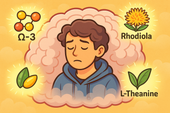
Brain Fog and Body Dysmorphic Disorder: Can Nootropic Supplements Help?
Brain fog often accompanies Body Dysmorphic Disorder, clouding focus and deepening emotional fatigue. Nootropic supplements like L-theanine, Rhodiola, and CoQ10 can help restore mental clarity, balance neurotransmitters, and bring calm energy back to the mind 🌿🧠.
-

How Stress Hormones Like Cortisol May Worsen Body Dysmorphic Disorder
Chronic stress floods the brain with cortisol — the hormone that keeps you on high alert. In Body Dysmorphic Disorder, this chemical overdrive fuels anxiety, distorts self-image, and traps the body in survival mode. Calming cortisol helps restore both peace and perspective 🌿🧠.
-

The Role of Neurotransmitters in BDD—and How Supplements May Help
Neurotransmitters like serotonin, dopamine, glutamate, and GABA shape how people with Body Dysmorphic Disorder perceive themselves. When these brain messengers fall out of balance, perception distorts — but targeted supplements can help restore calm, focus, and emotional regulation 🧠🌿.
-

What Is Body Dysmorphic Disorder? A Deeper Look at the Mind-Body Connection
Body Dysmorphic Disorder (BDD) isn’t just about appearance — it’s about perception. When brain chemistry, trauma, and stress distort self-image, the mind begins to see flaws that aren’t truly there. Healing starts by calming the nervous system and reconnecting mind and body 🪞🧠.
-
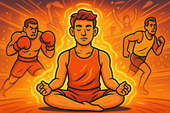
Keeping Calm in Competitive Sports: How to Train Your Mind, Body, and Chemistry for Peak Performance
Competitive pressure can overwhelm even the strongest athletes — but calm is trainable. By combining supplements like magnesium, L-theanine, and adaptogens with breathwork and mindset training, you can stay focused, balanced, and in control under any level of stress 🧠🏅.
-
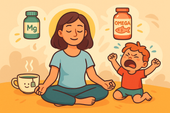
Supplements for Parents Facing Toddler Tantrums: Staying Calm When Little Emotions Run Wild
Toddler tantrums can drain even the most loving parent — but your calm is powerful. With the right supplements like magnesium, L-theanine, and ashwagandha supporting your nervous system, you can stay patient, grounded, and kind, even when emotions run high 🧸🌿.
-

Workplace Stress and Anger Management Support
Workplace stress can quickly turn into frustration — but calm is a skill you can train. By combining supplements like magnesium, L-theanine, and adaptogens with breathwork and mindset tools, you can stay focused, patient, and emotionally grounded no matter how intense the office gets 💼🌿.
-

How to Stay Patient With Family During Stressful Holidays
Holiday gatherings can stir up old stress and test your patience — but calm is possible. With nervous system support from magnesium, L-theanine, and adaptogens, plus mindful breathing and clear boundaries, you can stay centered, kind, and grounded even when family chaos unfolds 🎄💞.
-

Supplements to Keep Calm During Traffic Jams
Getting stuck in traffic doesn’t have to ruin your mood. With calming supplements like magnesium, L-theanine, and ashwagandha, you can train your body to stay relaxed and focused behind the wheel — turning gridlock into a moment of grounded patience 🚗🌿.
-
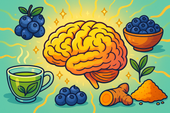
The Role of Antioxidants in Healing Brain Stress from Dissociation
Antioxidants protect the brain from the oxidative stress caused by trauma and dissociation. By neutralizing free radicals and supporting mitochondrial recovery, they help restore clarity, focus, and emotional balance — allowing the mind to heal at the cellular level 🌿🧠.
-
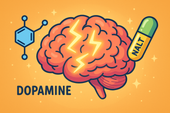
N-Acetyl L-Tyrosine (NALT) for Supporting Mental Clarity
N-Acetyl L-Tyrosine (NALT) fuels dopamine production — the neurotransmitter of focus and motivation. By supporting brain chemistry during stress, NALT helps restore mental clarity, energy, and alertness, making it easier to think clearly and feel present again ⚡🧠.
-

How Ginseng May Improve Focus and Energy in Dissociation
Ginseng helps combat the mental fatigue and fog that often come with dissociation. By supporting mitochondrial energy, balancing neurotransmitters, and regulating cortisol, it gently restores focus, motivation, and emotional presence — helping the mind reconnect with clarity and strength 🌿⚡.
-
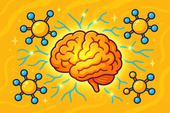
Phosphatidylserine and Dissociation: Supporting Cognitive Function
Phosphatidylserine helps calm the stress response by balancing cortisol, the body’s primary stress hormone. By lowering cortisol spikes, it protects memory, focus, and emotional stability — restoring clarity and mental presence for those struggling with dissociation 🧠🌿.
-
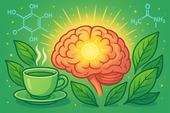
Can Green Tea Extract Help with Dissociative Brain Fog?
Green tea extract may help lift dissociative brain fog by supporting neurotransmitter balance, reducing inflammation, and enhancing energy at the cellular level. With its key compounds EGCG and L-theanine, it promotes calm focus, clarity, and emotional presence — helping you feel more alert and grounded 🍵🧠.
-
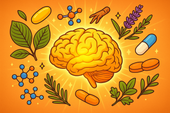
Building a Natural Supplement Stack for Dissociation Support
Building a supplement stack for dissociation means nourishing the brain and body back into communication. By supporting neurotransmitters, gut health, and energy balance through nutrients like magnesium, omega-3s, curcumin, and probiotics, you can help restore clarity, calm, and connection — one layer at a time 🌿🧠.
-

Chamomile and Lavender for Dissociative Anxiety Relief
Chamomile and lavender work together to calm dissociative anxiety by soothing the nervous system and restoring emotional safety. Their natural compounds balance cortisol, enhance GABA activity, and activate the vagus nerve — helping you feel grounded, connected, and at peace again 🌿💜.
-
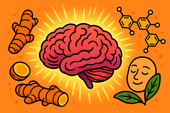
Curcumin for Inflammation and Mental Clarity in Dissociation
Curcumin, the golden compound in turmeric, does more than fight inflammation — it helps clear the mental fog often tied to dissociation. By calming neuroinflammation, balancing neurotransmitters, and supporting mitochondrial energy, curcumin can restore mental clarity, focus, and emotional presence 🌿🧠.
-
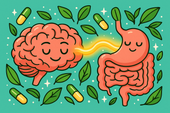
Probiotics and Dissociation: Exploring the Gut–Brain Axis
The gut–brain axis plays a vital role in emotional awareness and presence. When the microbiome is balanced, it supports serotonin production, vagus nerve activity, and calm focus. Probiotics help repair this connection — restoring safety, clarity, and the feeling of truly being in your body again 🌿🧠.
-
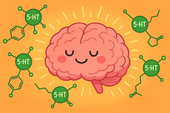
5-HTP for Dissociation: Supporting Serotonin and Emotional Stability
5-HTP helps bridge the gap between emotional numbness and stability by supporting serotonin production — the neurotransmitter that shapes mood, sleep, and sensory awareness. For people experiencing dissociation, 5-HTP may gently restore connection, presence, and emotional balance from the inside out 🌿🧠.
-
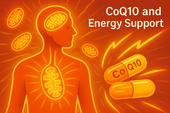
CoQ10 and Energy Support for People with Dissociation
Chronic dissociation often leaves the body running on empty — tired, foggy, and disconnected. CoQ10 helps recharge that system at the cellular level by restoring mitochondrial energy, reducing oxidative stress, and supporting the brain’s capacity to stay present. It’s energy medicine for both body and mind ⚡🧠.

















































